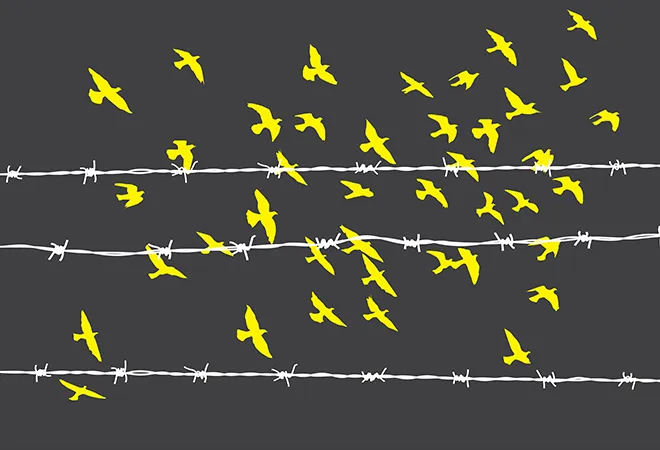-
CENTRES
Progammes & Centres
Location
Just like COVID-19 — climate change has the potential to destabilise various systems and institutions while simultaneously deepening the schisms between communities.

The unpredictable and pervasive nature of COVID-19 has influenced security conflicts across the globe in numerous ways. A few broad trends have come to light. Firstly, terrorist and extremist groups have used the pandemic as an opportunity to step up their attacks across different conflict theatres. These include Nigeria where Boko Haram is active, and Syria and Iraq where the so-called Islamic State has been ramping up its presence.
Such an escalation of violence is due to the increased governmental reliance on military troops across different regions to handle the pandemic, reducing their capacity to effectively protect targets from attacks. For instance, the Indian military in Kashmir has been called on to engage with quarantine facilities as well as enforcement of social distancing, thus allowing terrorist groups to conduct more cross border attacks.
Secondly, terror groups have also launched viral misinformation campaigns to increase the mayhem and chaos that has stemmed from the crisis, and various governments’ (mis)handling of the situation. This included highlighting the failing official responses as a reason to contend against the legitimacy of different governments, as highlighted in Egypt and Libya, targeting minorities as the cause of spreading the virus as was done by far right groups in the West as well as Hindu extremists in India. This also helped in capitalising on the polarisation of society to recruit more people, as was attempted by pro-Islamic State entities in India.
Lastly, terrorist groups have also been engaged in providing emergency aid services to affected populations. This is both a matter of necessity, especially for terrorist groups that control territory (such as the Taliban), and an opportunity for those who want to underscore their ability to perform better than the government.
Although there are other ways in which terrorist groups have mobilised during this pandemic, one thing is clear: the pandemic has exposed faultlines and weaknesses within different governments to varying levels. Factors such as citizen disenfranchisement, extremist hatred of minorities, lack of emergency/welfare services by governments and reduced military attention to tackle extremist violence, among others, have historically played a strong role in radicalising individuals or helping terrorist groups recruit more people. The pandemic only strengthened these factors.
"Factors such as citizen disenfranchisement, extremist hatred of minorities, lack of emergency/welfare services by governments and reduced military attention to tackle extremist violence, among others, have historically played a strong role in radicalising individuals or helping terrorist groups recruit more people."
In this vein, security analysts and policymakers should consider future scenarios where terrorist groups may use such global black swan events to their advantage. And one such scenario that will provide more fuel to terrorist groups, but will be much more gradual, is climate change.
Just like COVID-19, climate change has the potential to destabilise various systems and institutions while simultaneously deepening the schisms between communities. Take the above three scenarios and swap COVID-19 for climate change, and the he same results will likely persist.
Firstly, like COVID-19, many militaries are often drawn up during disasters such as floods, earthquakes and hurricanes. This reliance on militaries for emergency services often results in reduced focus on terrorist and insurgent groups, thereby allowing them to mobilise, reorganise and even conduct more attacks. This is manifest in the Philippines where the redeployment of the military to disaster zones reduces its counter insurgency capacity in conflict hotspots like Mindanao among others, allowing groups to increase their operations.
Similarly, terrorist and extremist groups are also fully capable of using misinformation campaigns related to climate change and its effects (just as they have done during the current pandemic). For instance, climate change is already causing mass migration of affected people from low lying coastal areas to inner lands to avoid flooding and other related issues.
"The increasing prevalence of environmental refugees, fleeing from natural disasters, classified according to race, religion and other subcultures, will likely provide more opportunities for extremists to spread hate, and for terrorists to recruit members."
In South Asia, there is proof that refugees who have been forced to move to countries like Bangladesh and India are often at the receiving end of hate propaganda by right wing elements that believe that immigrants are eating into local resources. This has been used by terrorist groups such as Al Qaeda in the Indian Subcontinent (AQIS) to try and enlist more individuals from refugee camps. The increasing prevalence of environmental refugees, fleeing from natural disasters, classified according to race, religion and other subcultures, will likely provide more opportunities for extremists to spread hate, and for terrorists to recruit members.
In the final instance, Asia has been witness to the phenomenon of proscribed extremist groups, such as Jamat ud Dawah in Pakistan, stepping in and taking charge during multiple natural disasters induced, in part, by climate change. For instance, in the 2005 and 2015 earthquake as well as the 2010 floods in the country, the group’s members were at the forefront of relief efforts, thereby ramping up their image in the eyes of the population. There is scientific proof that climate change is expected to cause many more natural disasters across South Asia which can be exploited in a similar fashion by such groups.
Climate change is going to be the bane of Asia, with South and Southeast Asia being among the worst-hit regions. Indeed, the International Monetary Fund (IMF) has estimated that climate change will acutely affect agriculture, tourism and trade across the Philippines, Indonesia and Myanmar, whereas India, Nepal, Sri Lanka and Bangladesh are touted to be among the top twenty nations that will be most affected by the phenomenon over the coming few decades. This is ominous for a region which houses multiple insurgencies, terrorist and extremist groups.
"The relationship between climate change, strategic security and conflict/terrorism is still not a mainstream debate amongst policymakers."
With the onset of climate change and its effects, it is inevitable that more such faultlines will be exposed. Yet, most policymakers would be slow to the uptake simply because climate change related disasters are not direct and immediate in nature. Moreover, the relationship between climate change, strategic security and conflict/terrorism is still not a mainstream debate amongst policymakers.
Against this backdrop, security researchers and policymakers need to upgrade their understanding of the same. Research centres across the region should dedicate some of their resources on how climate change can exacerbate the regional security situation. If COVID-19 has taught the world anything, it is that unexpected disasters such as the pandemic have many secondary effects on all aspects of human society. It would be folly to not apply such learning to an expected and likely inevitable natural phenomenon that is coming our way.
The views expressed above belong to the author(s). ORF research and analyses now available on Telegram! Click here to access our curated content — blogs, longforms and interviews.

Dr. Mohammed Sinan Siyech is a Non – Resident Associate Fellow working with Professor Harsh Pant in the Strategic Studies Programme. He works on Conflict ...
Read More +